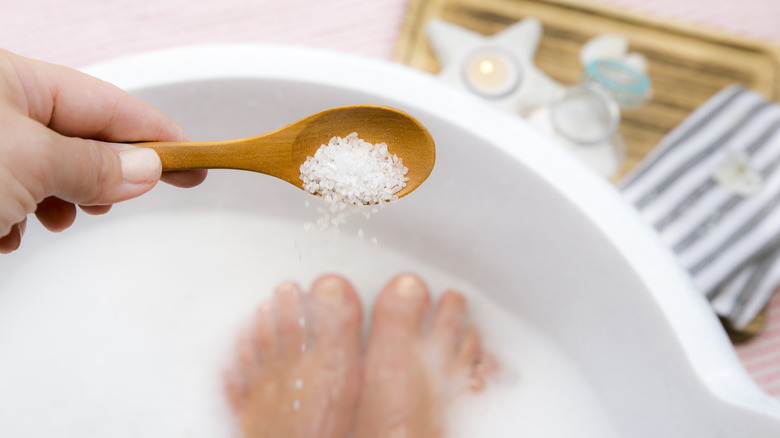The Benefits Of The Hailey Bieber-Beloved Epsom Salt Bath
We all have our own way to unwind at the end of the day and relax. Some of us indulge in some form of sexual self-care, others reach for a couple glasses of wine, then there are those who take to the bathroom for a long, hot bath. While bubble baths may be the most traditional way to unwind, Epsom salt baths are gaining in popularity — especially after Hailey Bieber mentioned her love for them.
"I usually take time for myself at the end of the day. I love to do a bath with candles and bath salts," Bieber told Marie Claire in 2021. "I think Epsom salt is really good for detoxing your body and your muscles. I might throw on a little face mask and hang." But just because a celebrity touts something as being a great wellness hack with many benefits, it doesn't always mean that it automatically is. In fact, the jury is still out on just how effective Epsom salt is on healing the body.
"There's not a lot of research on this, though, and it's conflicting," director of the Center for Integrative Medicine at the University of Maryland School of Medicine Chris D'Adamo, PhD tells Self. "My perspective is that we probably can absorb the Epsom salts through a bath, but to what extent, we're just not sure." But while the science is saying one thing, there are those who take Epsom salt baths regularly and stand by them and their effectiveness. If you want to jump on the Epsom salt bath bandwagon, then there are a few things you want to know first.
The possible benefits of Epsom salt baths
Not to be confused with table salt, Epsom salt is a natural mineral made of magnesium and sulfate. While Epsom salt baths may be relatively new to some, according to the Cleveland Clinic, people have been using it for centuries to treat a myriad of aliments; from aches and pains to constipation.
The biggest possible benefit of Epsom salt is its ability to reduce sore muscles. "Magnesium regulates your electrolyte balance, which is needed for calcium regulation and potassium absorption," wellness coach David Chesworth tells Real Simple. "In an Epsom salt bath, the magnesium ions are released in the water, which may help the body use up glucose and lactic acid, and may provide some relief from soreness, inflammation, and muscle cramps." Epsom salt has also been associated with relieving stress and decreasing inflammation. A 2018 study published in Nutrients and a 2016 study published in Advances in Medicine found that healthy levels of magnesium can considerably reduce stress and improve one's mental health, respectively. Epsom salt has exfoliating properties, leading to softer skin and aiding in dermatitis issues.
Although naturally formed, then mined, Epsom salt can be man-made by combining sulfuric acid with magnesite or magnesia. Of course, such a thing can't be done by the average person in their kitchen, but instead must be created in a lab by someone who knows their way around the period table of elements. Epsom salt is relatively inexpensive, doesn't require a prescription, and can easily be bought at pharmacies or grocery stores with a wellness section.
What you need to know before trying Epsom salt baths
Although the benefits can be great, that doesn't mean Epsom salt is everyone's friend. For example, those with sensitive skin may not fare well with these types of baths, nor are they a good idea if you have any open wounds. Also, no matter what you read about supposed Epsom salt "detox" sessions , Epsom salt shouldn't be ingested. Not only is it going to do a number on your bowels, but it's dehydrating and extremely dangerous. A 2020 study published in The Journal of Emergency Medicine found that high levels of magnesium are poisonous to the body, resulting in dialysis.
If you want to give Epsom salt baths a try, Medical News Today suggests combining two cups of the salt with a "standard-size bathtub." In other words, if you have one of those big, fancy tubs that fits you and half a dozen of your closest friends, then you'll want to use more salt. "Using the recommended amount of Epsom salt is important to get the maximum potency," functional medicine doctor Will Cole, D.C., IFMCP tells Mind Body Green. "If you dilute it, you'll lessen the benefits." While it takes about 15 to 30 minutes for the benefits to kick in, you can soak for up to an hour. Naturally, if somewhere between 45 and 60 minutes, you start to feel like you've overdone it, then be smart about what your body is telling you and get out of the tub. The general consensus is at least one bath per week is the minimum required to reap the benefits, though opting for two to three might be worth your while.


